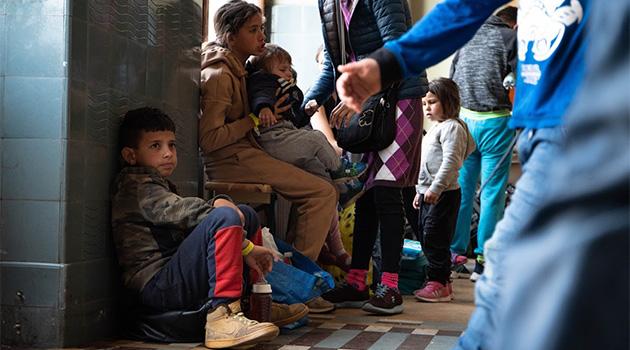British newspaper The Guardian reports on the festering crisis at the main railway station in Prague, Czech Republic

The situation of Romani refugees from Ukraine at the main railway station in Prague has been noticed by the British daily The Guardian. Their reportage calling it a “festering crisis” describes how hundreds of people are spending the night there in conditions not conducive to personal hygiene and also reviews the approach taken by the authorities in the Czech Republic.
“Prague’s central railway station seems a picture of normality amid warm spring sunshine and the return of legions of tourists, who had been largely absent at the height of Covid. On the platform one weekday morning, two German sightseers gaze curiously at the statue of Sir Nicholas Winton, the British stockbroker who helped 669 mostly Jewish children escape from Nazi-occupied Czechoslovakia on the eve of the second world war. Yet just yards away, hundreds of Roma people are sheltering in the only place available to them since they joined the millions of Ukrainians fleeing the Russian invasion. Unlike other Ukrainians who have been offered refugee visas, these families have found they have nowhere to go and no one who wants them,” the paper reports.
The situation of hundreds of refugees is described by the daily as a “festering crisis” that developed over the last few weeks. The Guardian reports that more people are spending the night at that location than there is room for in the temporary shelter set up there.
The paper quotes humanitarian workers providing aid at the railway station who say they are overburdened. The Organization for Aid to Refugees (OPU), which is overseeing the assistance provided by nonprofit organizations at the station, wants to end its activities there by the close of May along with other groups of volunteers.
The Guardian reports that the nonprofits hope to pressure the Czech Government into arranging more appropriate accommodation for the refugees. Geti Mubeenová of OPU told the paper the organization had been established to provide information to refugees about their legal status and options, but currently they are involved in a crisis that is humanitarian in nature.
“Many [Romani refugees] are waiting for the Czech authorities to decide on their status and whether they qualify for permanent accommodation; others are in an even bleaker situation,” The Guardian reports. “We tried to register for refugee protection at the registration centre but they wouldn’t accept us and didn’t give us any document explaining why,” the paper quotes Zanna, a teenage mother of three from Kyiv, who said that she had arrived in Prague with her family four days earlier.
“We came here looking for a place to stay but instead we are just lying on the floor like dogs. We are exhausted and have no energy any more. I’m just feeling really hopeless,” Zanna told The Guardian.
According to the humanitarian workers with whom the paper spoke, this story is typical for many of the Romani people arriving in the Czech Republic. As of 24 February, when Russian President Vladimir Putin ordered Russian troops to invade Ukraine, the Czech Republic has issued more than 350 000 temporary protection visas.
According to the Czech authorities, however, many Romani refugees from Ukraine also hold Hungarian passports and are thereby also citizens of the European Union, and according to the rules, they are ineligible for temporary protection in the Czech Republic. Mubeenová told The Guardian that just one-fifth of the refugees stuck at the main railway station are also citizens of Hungary and that what is standing in the way is anti-Roma bias, among other matters.
News server Romea.cz has been attempting for the third week in a row to get the authorities to release the specific number of refugees from Ukraine who hold Hungarian passports. So far the news server has not succeeded and it is not, therefore, clear what the authorities are basing their policy on when they allege that “many” Romani refugees also hold such travel documents.
In the middle of this chaos, however, one man had a pretty happy story to tell The Guardian. Heorhii Stan (age 37), originally from Odessa, had been successfully granted temporary protection in the Czech Republic along with his four children and was heading to Vienna to fetch his wife.
“I really want to integrate here and ensure my kids go to school,” he told the daily. “And I want to work.”
